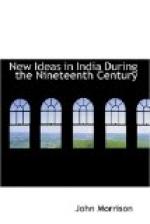[Sidenote: The [=A]rya Sam[=a]j and the name Father.]
[Sidenote: The Hindu College, Benares, and the name Father.]
The [=A]rya Sam[=a]j, on the other hand, seems set against speaking or thinking of God as the Father. Specially present to their minds and in their preaching is the thought of God’s absolute justice; and they hold that His Justice and His Fatherhood are contradictory attributes. Virtue will have its reward, they assert, and Sin its punishment, both in this and the following existences. We recognise the working of their doctrine of transmigration, perhaps also the effect of a feeble presentation of the Christian doctrine of the Father’s forgiveness of sin. Nevertheless, we may note in a hymn-book published in London for the use of members of the [=A]rya Sam[=a]j resident there, such hymns as “My God and Father, while I stray,” and “My God, my Father, blissful name,” as if the name were not explicitly excluded. We also read that the very last parting words of the founder of the [=A]ryas himself were: “Let Thy will be done, O Father!"[86] The heart of man will not be denied the name and the feeling of “God who is our home.” Turning again from the [=A]ryas to the new citadel of Benares, and Hinduism, the Hindu College, Benares, we find that along with the Text-book already mentioned, there was published a Catechism in Hindu Religion and Morals for boys and girls. One question is, “Can we know that eternal Being (the “One only without a second,” or “The All,” i.e. pantheistic Deity)? The answer is, “Only when revealed as Ishwar, the Lord, the loving Father of all the worlds and of all the creatures who live in them.” That idea of the loving Father, of divine Law and Love in one person, is new to Hinduism. The law of God may be only imperfectly apprehended, but the loving Fatherhood of God, the approachable one, has become manifest in India—one of Christianity’s dynamic doctrines. Strangest confirmation of all, a Mahomedan preacher of Behar a few years ago was expounding from the Koran the Fatherhood of God. The name and thought of the divine Father established, we may leave name and thought to be invested with their full significance in the fulness of time.
“It is with Pantheism, not Polytheism, that a rising morality will have to reckon,” says Sir Alfred Lyall.[87] The result of all our observation has been different. Pantheism is melting out of the sky of the educated, and if nothing else take its place, it will be a selfish materialism or agnosticism, not avowed or formulated yet shaping every motive, that the new morality will have to reckon with.




